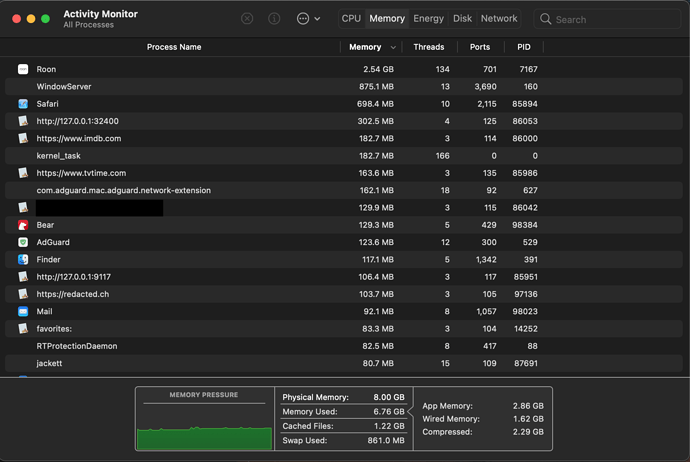Roon Core Machine
- macOS Big Sur 11.6.7
- Core installed on 2014 MacBook Pro (MBP) - 8 GB RAM - 2.8 GHz Dual-Core Intel Core i5 - 500 GB SSD
- Roon Core 1.8 (build 988)
- Remote - iPhone 13 running latest version of iOS (15.5) and build 988
Networking Gear & Setup Details
- Netgear Nighthawk X6 R8000
- Using MBP and iPhone on 5 GHz WiFi channel with a 2.4 GHz SonosNet for my 9 Sonos devices
Connected Audio Devices
- 9 Sonos speakers, all purchased in 2014, in 5 rooms
- 3 Play:1’s in individual rooms
- HT setup with Playbar, Sub, and 2 Play:3’s as surrounds
- 2 Play:3’s as a stereo pair in another room
- using SonosNet as none of these speakers are airplay compatible
Number of Tracks in Library
- In trial period so have only added 709 tracks from my library so far.
- Library is located on the same MBP that is running Core.
- Have also added 169 Qobuz tracks.
Description of Issue
Currently evaluating Roon. Love the interface, general functionality (especially compared to the Sonos controller app), and the Qobuz integration. But I’ve noticed unacceptable sluggishness when trying to use the Roon app on my MBP. Mainly things like slow, hesitant scrolling and delays after clicking on things such as volume, signal path, devices, forward/back/play/pause, etc. When this is happening I’ve noted in Activity Monitor that Roon memory usage, which starts out around 500 MB when Roon is opened, is now between 1-1.75 GB, and memory is being swapped to the SSD. The processor temp also increases up to around 200F and the fan kicks in.
If I leave the Roon app alone on the MBP and control everything using my iPhone 13, then things seem to run smoothly. I do use the Roon app on the Mac to display lyrics, cover art, etc. and to look at artist/album profiles, but am controlling playback, volume, etc. using my iPhone.
If I turn off my MBP, iPhone, and router, restart everything, and only open the minimum number of apps necessary on my MBP, Roon starts out running smoothly. But it eventually will get sluggish and RAM usage will shoot up again to the 1-1.75 GB level.
Edit: Here’s a screenshot I just took of Activity Monitor. Roon memory usage up to 2.5 GB.
